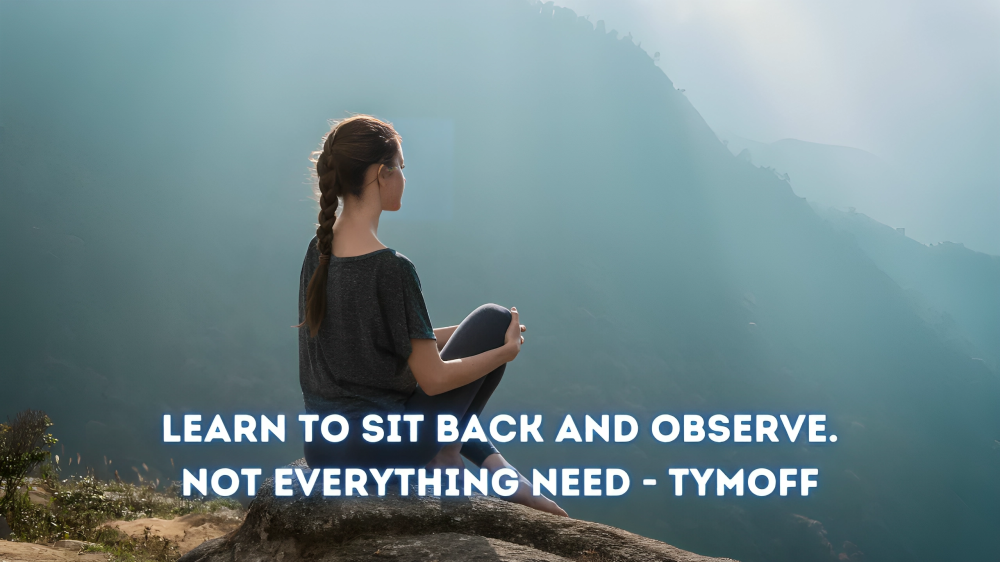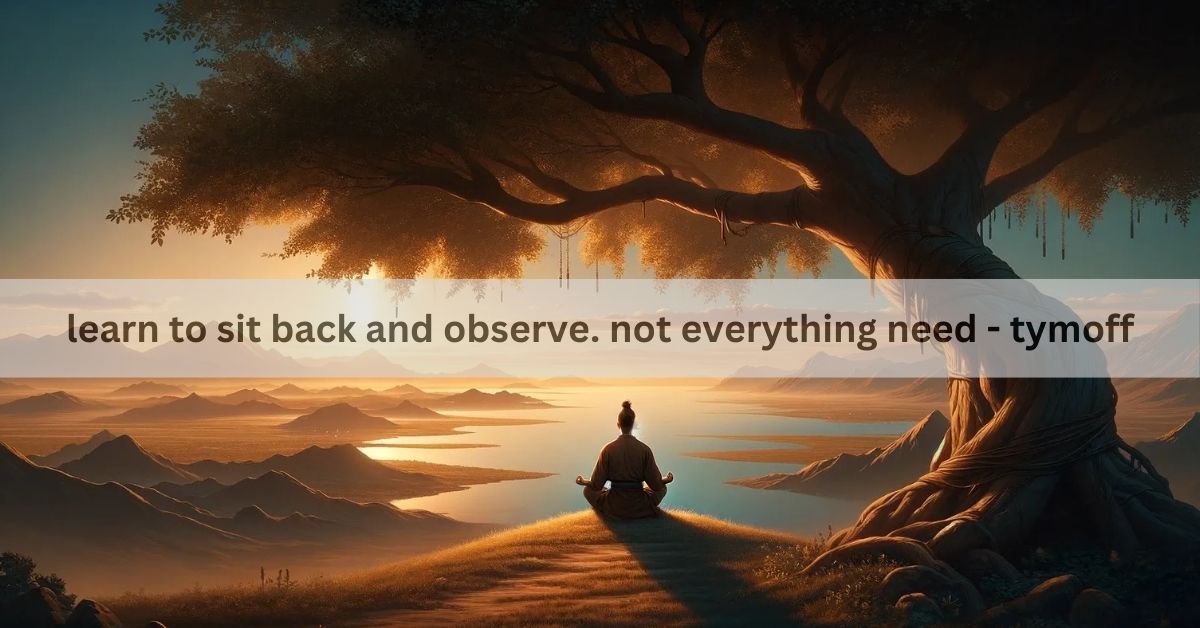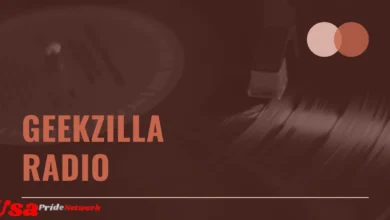In today’s fast-paced world, we often feel the need to be constantly active, engaged, and in control of every situation. However, the wisdom behind the idea of learn to sit back and observe. not everything need – tymoff offers a refreshing perspective. This concept teaches us that not every moment requires action or involvement. Sometimes, stepping back and allowing life to unfold on its own is not only healthy but also incredibly empowering.
In this article, we will explore the power of sitting back, observing, and the importance of taking time off when necessary. By embracing the idea of learn to sit back and observe. not everything need – tymoff, you can improve your mental well-being, enhance personal growth, and lead a more balanced life.
Understanding the Importance of Observing

Learn to sit back and observe. not everything need – tymoff suggests a shift in mindset. Instead of feeling obligated to react to every situation, we should learn to observe and let things take their course. This approach is rooted in mindfulness and emotional intelligence. When we constantly react to our environment, we expend energy and stress ourselves unnecessarily. By sitting back and observing, we can gain better clarity and a deeper understanding of our surroundings and ourselves.
The Power of Observation in Personal Growth
Learning to observe is one of the most effective tools for personal growth. When you take the time to observe without judgment, you become more aware of your thoughts, emotions, and the world around you. This awareness allows you to make better decisions, improve your relationships, and gain insight into your goals and desires.
Many people mistakenly believe that to achieve success, they must be actively engaged in every aspect of their life. However, learn to sit back and observe. not everything need – tymoff reminds us that stepping back can lead to a clearer vision and, often, better outcomes. You don’t need to be involved in everything to make progress.
The Mental and Emotional Benefits of Taking Time Off
When we talk about learn to sit back and observe. not everything need – tymoff, we are also discussing the importance of taking time for yourself. Time off is essential for mental and emotional well-being. Constantly pushing yourself to do more, achieve more, and be more can lead to burnout and emotional fatigue.
Taking time off, whether it’s a brief moment of rest during the day or a more extended period, is a form of self-care. When you learn to sit back and observe, you create space to recharge and reflect. This can lead to greater emotional stability, reduced stress, and improved focus. The ability to pause, take a breath, and simply observe can be transformative for your overall well-being.
How Time Off Enhances Clarity and Decision-Making
The principle behind learn to sit back and observe. not everything need – tymoff also applies to decision-making. Often, when we are caught up in the heat of a moment or overwhelmed by multiple tasks, we may make hasty decisions that don’t serve us in the long run. By taking a step back and observing the situation, we gain perspective and clarity. This helps us make thoughtful, informed decisions.
For example, when facing a challenge, rather than rushing in with solutions, take a moment to reflect. By sitting back, you allow yourself to process your thoughts and feelings without the pressure to act immediately. This pause can help you approach the problem with a clearer mind and a more effective solution.
How to Practice Sitting Back and Observing
Learning to sit back and observe might seem like a difficult habit to develop, especially for those who are used to being constantly engaged. However, it’s a skill that can be cultivated over time. Here are a few steps to help you incorporate the concept of learn to sit back and observe. not everything need – tymoff into your daily routine:
1. Mindfulness Practices
Mindfulness is the practice of being fully present and aware in the moment. By practicing mindfulness, you train your mind to observe without judgment. You can start by simply paying attention to your breath or the sensations in your body. Mindfulness encourages you to observe your thoughts without getting caught up in them, which directly aligns with the idea of sitting back and observing without feeling the need to intervene.
2. Journaling and Reflection
Journaling is another great way to learn to sit back and observe. When you take time to write down your thoughts and feelings, you create space for reflection. This practice allows you to step back from a situation and analyze it from a different perspective. By regularly journaling, you can train yourself to observe your emotional responses, leading to better emotional regulation and self-awareness.
3. Engage in Non-Reactive Listening
When you are engaging with others, focus on listening rather than responding immediately. This is a form of observing that can improve your relationships and communication skills. By learning to listen without rushing to reply, you allow the other person to fully express themselves, and you gain a better understanding of their perspective.
4. Create Time for Stillness
Set aside time in your day to be still and do nothing. This may seem counterproductive at first, but it’s an essential part of learn to sit back and observe. not everything need – tymoff. By allowing yourself to simply be, you create space for relaxation and clarity. Whether through meditation, nature walks, or quiet moments at home, stillness helps you reconnect with yourself.
Why “Not Everything Needs Action” Is Empowering

One of the core messages of learn to sit back and observe. not everything need – tymoff is that not everything requires action or a response. In a world that constantly pushes us to be busy, this reminder is empowering. Sometimes, the most powerful thing you can do is to allow life to unfold without intervening at every turn.
For instance, when dealing with interpersonal conflicts or challenges, it can be tempting to immediately react. However, often the best course of action is to sit back and observe the situation before making any decisions. By doing so, you allow yourself to respond from a place of calm and clarity, rather than from a place of emotion or frustration.
FAQs About Learn to Sit Back and Observe. Not Everything Need – Tymoff
1. What does it mean to “sit back and observe”?
“Sitting back and observing” means stepping away from active participation and allowing things to unfold naturally. It’s about observing your surroundings, thoughts, and emotions without feeling the need to react or intervene immediately.
2. How can I incorporate the idea of “not everything needs action” into my life?
You can start by practicing mindfulness, taking time to reflect before reacting, and recognizing that not every situation requires your immediate input or involvement. Allow yourself to step back when necessary.
3. Why is it important to take time off?
Taking time off helps prevent burnout, improves mental clarity, and supports emotional well-being. It’s a way to recharge, reflect, and gain perspective on your life and decisions.
4. How does “sitting back” improve decision-making?
When you take time to observe rather than immediately react, you give yourself the space to make more thoughtful, intentional decisions. By removing the pressure to act quickly, you can approach challenges with greater clarity and focus.
5. What are the long-term benefits of learning to sit back and observe?
The long-term benefits include improved mental health, reduced stress, better decision-making, increased self-awareness, and the ability to engage with life more thoughtfully and intentionally.
Conclusion: Embrace the Power of Observation
The concept of learn to sit back and observe. not everything need – tymoff is a powerful tool for personal growth and well-being. By practicing observation instead of constant action, you create space for clarity, emotional regulation, and improved decision-making. In a world that often values constant hustle and busyness, taking time to step back is a revolutionary act. Embrace this approach and enjoy the many benefits of learning to observe before reacting.




